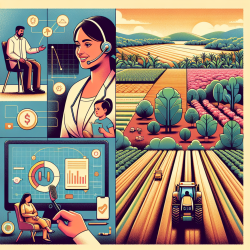Introduction
As practitioners dedicated to fostering positive outcomes for children, we often seek innovative ways to enhance our approaches. A recent study, "Developing an agenda for research about policies to improve access to healthy foods in rural communities: a concept mapping study," provides valuable insights that can be leveraged to improve access to healthy foods, particularly in rural areas. This research offers data-driven strategies that can be integrated into our practices to promote better health and learning outcomes for children.
Key Findings from the Research
The study identifies critical factors influencing access to healthy foods in rural communities, where residents face higher risks for nutrition-related chronic diseases. The research highlights several priority areas for policy and research, including:
- Economic development strategies that support local food systems.
- Improving access to federal food and nutrition assistance programs.
- Enhancing food retail systems to offer more healthy options.
- Increasing personal food production capacity among rural residents.
These findings suggest that targeted policies and research can significantly improve access to healthy foods, thereby promoting better health outcomes for children in rural areas.
Implementing Research Insights in Practice
As practitioners, we can incorporate these insights into our work by advocating for and implementing policies that address these priority areas. Here are some practical steps:
- Advocacy: Work with local policymakers to develop and implement policies that support local food systems and improve access to nutrition assistance programs.
- Collaboration: Partner with local schools and community organizations to create programs that increase awareness and access to healthy food options.
- Education: Educate families about the importance of healthy eating and provide resources to help them make informed food choices.
- Research: Engage in further research to explore innovative solutions tailored to the unique needs of rural communities.
Encouraging Further Research
While the study provides a robust framework for improving rural food access, there is a need for continued research to refine and expand upon these findings. Practitioners can contribute by:
- Participating in research initiatives that explore the effectiveness of different policy interventions.
- Sharing insights and data from their own practice to inform larger studies.
- Collaborating with academic institutions to develop and test new approaches.
Conclusion
By leveraging the insights from this research, practitioners can play a pivotal role in improving access to healthy foods in rural communities. This, in turn, can lead to better health and educational outcomes for children. As we continue to advocate for and implement data-driven solutions, we can create a healthier, more equitable future for all children.
To read the original research paper, please follow this link: Developing an agenda for research about policies to improve access to healthy foods in rural communities: a concept mapping study.










